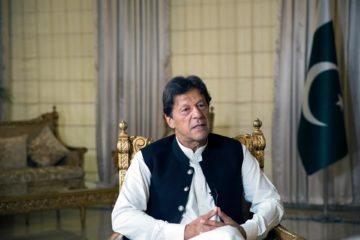Isaac Chotiner in The New Yorker:
 Thirty years ago, Imran Khan led the Pakistani national team to victory at the Cricket World Cup, cementing his place as one of the greatest athletes in the history of the sport, and as a hero in his country. He retired at the age of thirty-nine. Four years later, in 1996, he founded a political party called Pakistan Tehreek-e-Insaf (P.T.I.), and he began speaking out more on political and cultural issues. In 2013, his party started winning significant power, thanks largely to Khan’s popularity. Then, in 2018, in an election marred by polling irregularities, and with the support of Pakistan’s military, which wields de-facto control of the country, Khan was elected—or “selected,” as his opponents say—Prime Minister.
Thirty years ago, Imran Khan led the Pakistani national team to victory at the Cricket World Cup, cementing his place as one of the greatest athletes in the history of the sport, and as a hero in his country. He retired at the age of thirty-nine. Four years later, in 1996, he founded a political party called Pakistan Tehreek-e-Insaf (P.T.I.), and he began speaking out more on political and cultural issues. In 2013, his party started winning significant power, thanks largely to Khan’s popularity. Then, in 2018, in an election marred by polling irregularities, and with the support of Pakistan’s military, which wields de-facto control of the country, Khan was elected—or “selected,” as his opponents say—Prime Minister.
It was the culmination of a remarkable rise, but one fraught with irony: Khan had been an outspoken opponent of the American war on terror, and Pakistan’s two-faced role in fighting it, while at the same time accepting the help of Pakistan’s military, America’s partner in that war. (Pakistan’s military also helped bring the Taliban to power in Afghanistan, in the nineteen-nineties, and has nurtured it to varying degrees ever since.) Khan leads a party that is increasingly socially conservative, but he is famous internationally for what some have called his “playboy life style”: multiple marriages, claims of children out of wedlock. (The term “playboy life style” itself has a euphemistic feel, given Khan’s long history of misogynistic remarks, such as blaming sexual assault on what women wear.) Khan has also consistently made broadly sympathetic comments about the Taliban. (In 2012, for a Profile in The New Yorker, Khan told Steve Coll, “I never thought the Taliban was a threat to Pakistan”; by that time, various factions of the Taliban and their allies had murdered more than forty thousand Pakistanis.)
More here.
